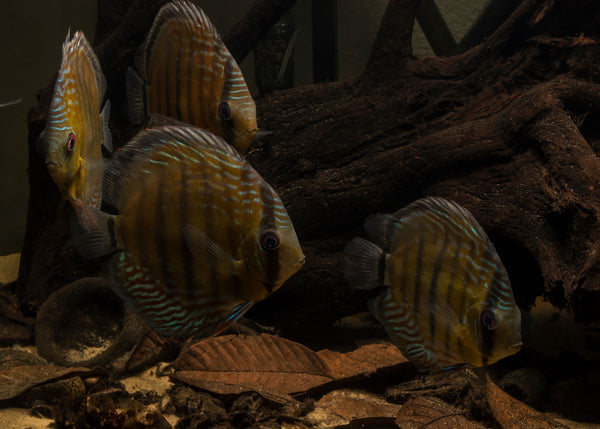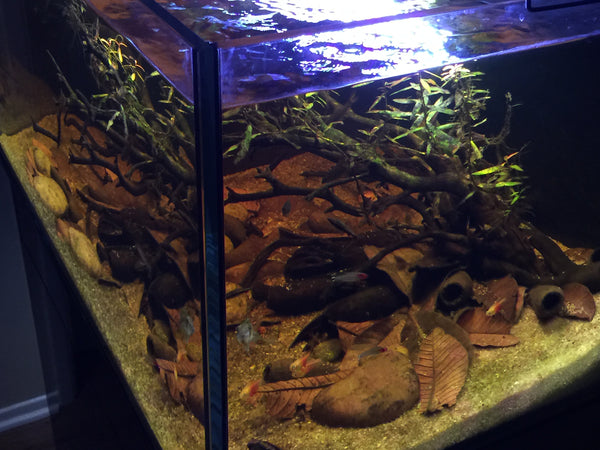- Continue Shopping
- Your Cart is Empty
Ways for hobbyists to fail...a primer for advanced hobbyists, LFS employees, and, well- anyone who cares...
Okay, at the bit of sounding just a bit negative today, I'm pondering on a few things that have been on my mind lately when talking to a few people about creating and maintaining botanical-style aquariums. I'm thinking that I felt like writing this blog today because, as more an more hobbyists get into the game, they're attempting to start brand-new to the aquarium world, in less-conventional areas of the hobby, like the blackwater tanks, Rift Lake cichlids, or complex planted tanks, without any type of fundamental foundation. Or at the very least, starting down these specialized roads with very limited general experience, and some bad assumptions.
There are a lot of articles, blogs, and tips on "how to succeed at this-or-that" aspect of the hobby, which is awesome. But those of us who have been in the hobby and industry for a while have seen a lot of, for want of a better term- the "dark side" of the aquarium hobby. We've seen all kinds of hobbyists, businesses, and ideas come and go. And after a while, you get a distinct feeling that you know what works and what doesn't. You can see when "the train is headed for the washed-out bridge", or "the ship is steering into the rocks", if you will. And if you're in a position to intervene...you should if you can.

Today, in the hope that we can all learn about what does NOT work, I give you 5 ways to fail with aquariums. (This is really geared towards YOU- the more advanced aquarist, or the LFS person- in the interest of creating a discussion track for you to run with when dealing with someone who is completely new to aquariums, or maybe slightly experienced and perhaps...a bit misled.)
It's kind of our job, as advanced hobbyists, industry types, and good stewards of the aquarium-keeping world to look at the absurdity of some of this stuff, so that we can prevent others from making these horrible mistakes! Here are my top 5. No doubt you have more, but it's a start!

1) Jump in without doing research. Yeah, seriously. The aquarium hobby as we know it has only been around for like 100 years or so. The tenants of basic aquarium husbandry are still wide open to “dismiss.” Examples? Well, don't worry about mixing fishes and plants from different environmental conditions together. They can adapt, right? Calling your an aquarium a “community aquarium somehow negates all of the potential downsides of mixing incompatible animals! Or, how about this one: "That Pike Cichlid won't reach 14 inches! Everyone knows that fishes will grow to the size of their aquarium" and "adapt' just fine to smaller tanks! "I'll get a larger tank down the line." (If I had a dollar for every time I heard THAT one...)

2) Believing that this or that product will relieve you of the need to obey basic husbandry principles. Yeah, really! If you use this additive or employ this filter media or gadget, there is no need to worry about water quality. Ever! Feeding this food will prevent fish disease. Or, using this electronic controller means you'll never have to monitor water chemistry again! You go right to the finish line immediately! Just spending the money on ____________ automatically grants you an exemption from the "aquarium-keeping gods" and gives you special status whereby you can dismiss all of the "rules" and achieve success with minimal attention and effort. "I read on internet about this guy who..." Ughh.

3) Accelerating the timeline when establishing a new aquarium. Hey, the kids want to see fish in by Saturday for the party. "I'll start with just a few hardy fishes: Like, a dozen Mollies, six Gouramis, a few "Algae Eaters" (gotta have those)..." We've all seen and heard the various claims out there: Todays modern filters, additives, and gadgets will help you succeed despite having any knowledge of what you're doing! The nitrogen cycle is "instantly established" and your aquarium can achieve biological balance in a day with this stuff!" Regrettably, marketing hyperbole when taken out of context can give a newbie the completely wrong impression of the capabilities and applications for a product.

4) Continuing at full speed even when stuff is going wrong and animals are dying. I've seen this a lot on the coral side of the trade: A customer will buy a bunch of livestock, experience horrific losses (generally due to a complete disregard-intentional or otherwise- for the lack of an established nitrogen cycle or other basic tenants of husbandry), conclude without real research that the losses were due to "bad corals", and then continue to the next LFS, online vendor, breeder, etc. and grab another bunch of animals to replace the ones that died. You see it in freshwater, too. After the second inevitable disaster ensues, some call "uncle" and either quit or make the effort to figure out why. Those who persist, continue to kill fish, buy and misapply products and equipment to solve the "problem", and typically leave the hobby soon after, concluding that "quality control" in the industry makes it impossible to succeed.

5) If you've developed a better way, or found a "breakthrough", don't share your experiences. Really. There is nothing anyone else can learn from you. Super tragic...You need to coax these types to share their gifts with the world! Of course, there are others who won't share information because of some dark agenda: You've figured out this information after years of triumph and tragedy, so you're not just going give it away! It's "proprietary" in nature, and other hobbyists should learn the way you did. Be grumpy, and lock yourself and your secrets in your fish room, away from the "unworthy" denizens of the larger aquairum-keeping world. Yeah, there are actually hobbyists who think this way. There is almost no way to turn them, tragic as it may seem. The solution: Run from them. Run quickly.

Okay, I've just scratched the surface here. There are probably thousands of ways to fail in the aquarium hobby, and I've touched on just a few. The real important takeaway here is for those of us in a position to help to see the signs, and know what to do.
To LFS and vendor types out there, I especially direct this part of my plea to you: I think it's imperative that we encourage anyone who enters this hobby to do the research before they leap into things. Honestly, even someone coming into your shop completely green, but eager to drop money, should leave with little more than information, or a book at least, before they purchase anything. Really.
A half hour of indoctrination in the LFS is just that- a half hour of indoctrination. It takes much more for the beginner to grasp what's really going on. And yeah, it seems "fantasy land" to take on this attitude when the internet beckons and competition is fierce, but I ask you: Wouldn't you rather send someone home with information first, and gain a long-term customer, than to just grab the quick and easy sale? Don't you think that someone who is successful in the hobby because you took the time to work with them will refer their friends to you? I do. Patience.

And if you are new and reading this. I commend you. A lot of your fellow neophytes, believe it or not, take an attitude that there is no need to pay some “dues." If you've achieve some success already, you've no doubt figured out the fact that you need to do at least some research. I can’t tell you how many times I spent tremendous amounts of time on the phone or on lengthy chat/email exchanges with neophyte "botanical-style" aquarium hobbyists who would literally ask me the most basic of questions, like, fundamental stuff-when this information is just everywhere- on line, in basic books- the kind of stuff you simply HAVE to know before you ever even buy a bag of sand or a light fixture, let alone embark on a journey into a specialized area with its own set of nuances, "quirks", and "best practices.

If you’re into something, wouldn’t you WANT to do some basic research? I mean, why try to keep Mbuna if you can't keep feeder guppies alive? Or, is it simply easier to buy first and then ask for an aquarium-keeping education from the dealer, and blame it on “whatever/whomever” when you fail?

I think too many of us want to solve problems with "products." I think that many aquarium problems are created by very basic mistakes, and that simply throwing money on the problem isn't really a solution. Rather, it's a "band aid." As advanced aquarists and industry people, I think we can change the paradigm a bit here...Rather than just offering the solution, whatever it may be, to the problem at hand, take the time to explain to the newbie just what it was that caused the issue in the first place, and how to prevent it. Knowing the cause, effects, and preventative/corrective measures to take is far better than simply buying this-or-that product as a “solution”, which just perpetuates the cycle of creating “minimum viable hobbyists”- i.e.; people who figure you don’t need to know the rules- you just kind of do it and then get “stuff” to fix the problems.

Preach patience to any new hobbyist. Get them to understand just how things work in a reef aquarium, and why things are done a certain way. Explain to them that aquariums, being natural systems, are affected by the same laws of nature as occur in the wild, and that grasping stuff like the nitrogen cycle, fish compatibility, environmental requirements, etc. will give them a greater understanding of what's going on, and how to recognize for themselves in the future when something is going wrong- or right! It's a better long term strategy, IMHO.

Above all, encourage sharing of information at all levels in the hobby. With the internet, there has never been a better time to learn about the hobby. To keep information that can help others accomplish things and solve problems in the hobby isn't just uncool- it's a tragedy that can have far-reaching consequences, especially in this era where the hobby and industry face mounting external pressures from ill-informed "environmentalists" and other "nature advocates", who would just assume lump aquarists in with loggers, oil producers, and blast fishermen. The hobby is ours to share, protect, preserve, and to pass on to our children. Or to lose.

So in conclusion, we should all learn to recognize the signs of a fellow aquarist who's headed in the wrong direction- not just because it's the honorable thing to do for them, but because of the greater good in the hobby that is served when we take the time to prevent them from failing.
It’s our shared responsibility.
Until next time, I leave you with that thought.
Stay focused. Stay concerned. Stay patient.
And stay wet!
Scott Fellman
Tannin Aquatics







Scott Fellman
Author